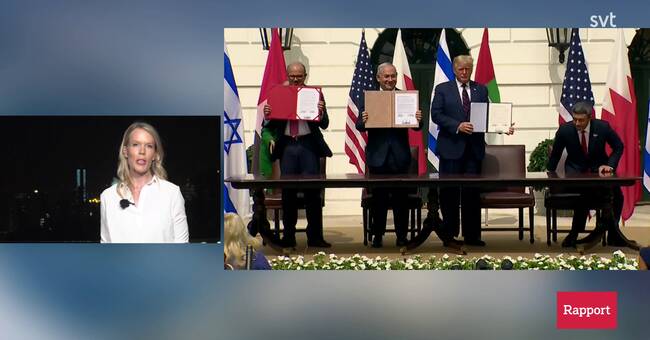Last week, a Facebook campaign for Donald Trump trumpeted that the US president has achieved "PEACE IN THE MIDDLE EAST".
In a region where diplomacy often moves slowly, the pace of recent weeks has appeared to be lightning fast.
Israeli tourists will soon be able to swim on the beaches of Dubai, and Israeli planes can fly over the Arabian Peninsula instead of flying around in a time-consuming detour.
But even if Israel is suddenly more accepted by the Gulf countries, the peace agreements with the United Arab Emirates and Bahrain that were signed today do not mean peace in the sense that a conflict ends.
No solution to the conflict with the Palestinians
Palestinian leaders have called the agreements treason and a knife in the back.
Not much has changed in the Palestinian territories, and Israel has not come close to a solution to the conflict with the Palestinians.
Although the United Arab Emirates has said that with the agreement, Israel has promised to suspend its planned annexations of parts of the West Bank, Israeli Prime Minister Benjamin Netanyahu has replied that the plans remain on the table.
Iran common enemy
Israeli Prime Minister Benjamin Netanyahu is grateful to Donald Trump, who he shares with several Gulf leaders.
The four leaders who met today in the White House also have a common enemy in Iran.
The timing - 48 days before the US election - is important.
Both the leaders of the Bahrain and the United Arab Emirates and the Prime Minister of Israel would like to see Donald Trump as the winner of the election.
They fear that Joe Biden will be more sympathetic to diplomacy with their arch-enemy Iran.
Biden is also considered to have a tougher attitude to the Gulf countries' violations of human rights.
Benjamin Netanyahu has received political support from Donald Trump in several critical situations and there is no doubt that he would like to contribute to a picture of Trump as a successful diplomat and peacemaker, a portrait the American president himself often paints.
Weapon delivery to the United Arab Emirates
The exact content of the agreements signed today has not yet been announced.
But a White House spokesman said the other day that the United States was "considering" selling advanced F35 warplanes to the United Arab Emirates.
Assessors see the arms deal as a condition from the United Arab Emirates to agree to the deal.
For Netanyahu, the trip to Washington will also be a welcome break.
He is facing a political crisis at home where criticism of the government's handling of the coronavirus and an impending corruption trial threaten his grip on power.
Previously unthinkable
The majority of Arab countries have previously refused to recognize Israel before there is a solution to the long-running conflict between Israelis and Palestinians.
Egypt and Jordan have been excluded.
It took 72 years for the first Gulf state - the United Arab Emirates - to establish diplomatic relations with Israel in August this year.
But it took only four weeks before the other Gulf state - Bahrain - decided to follow suit.
And although the agreements signed in Washington today are criticized for ignoring the situation of the Palestinians, they are of great importance.
Especially if it turns out that more countries are normalizing relations with Israel.
Sudan, Morocco and Oman are mentioned as possible successors.
Saudi Arabia leading the way
Many eyes will be focused on Saudi Arabia's representative at the White House ceremony today.
The great power Saudi Arabia has repeatedly said that a settlement with Israel is not relevant until the question of the future of the Palestinians is secured.
At the same time, it is unlikely that Bahrain would have made such a big decision without the approval of the Kingdom of Saudi Arabia.

